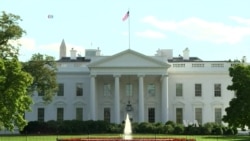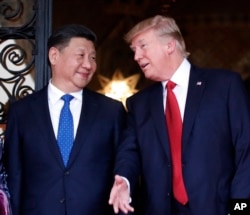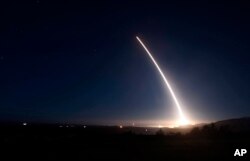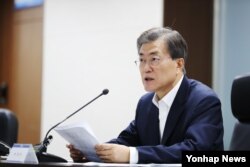U.S. President Donald Trump uttered assurances during the start of his Cabinet meeting on Monday morning that the threat from North Korea will be taken care of.
"We’ll handle North Korea. We’re going to be able to handle them. It will be handled. We handle everything," Trump said in response to a question from a reporter.
Asked later in the day whether a U.S. response might include a first strike on North Korea, White House Press Secretary Sarah Huckabee Sanders replied, "As we said many times before, the president's not going to broadcast any decisions, but all options are on the table."
WATCH: 'We'll Handle North Korea,' Says Trump
On Saturday, the president, a day after North Korea tested a ballistic missile it claims can reach all of the United States, took to social media with a blunt chastisement of China, which is North Korea’s powerful neighbor and its single significant ally.
"I am very disappointed in China," Trump wrote in a pair of Twitter posts. "...they do NOTHING for us with North Korea, just talk. We will no longer allow this to continue. China could easily solve this problem!"
That was a reversal of the praise the U.S. president had previously uttered for his Chinese counterpart, Xi Jinping, after Trump hosted him at Mar-a-Lago in early April. At that time, Trump expressed confidence that Xi would apply adequate pressure on Pyongyang to de-escalate tension on the Korean peninsula.
Chinese envoy deflects criticism
At the United Nations on Monday, China's U.N ambassador, Liu Jieyi, deflected any U.S. criticism, saying,"There are two principle parties to the issue of denuclearization and peace and stability on the Korean Peninsula: DPRK and the United States." He added that the two nations "hold responsibility to keep things moving, to start moving in the right direction, not China."
Joel Wit, an analyst who has been working on the North Korean proliferation problem for 20 years, inside and outside of government, said, "I would have told President Trump before he met with President Xi: 'Don't put too many cards in this deck. Don't bet on these guys to help you as much as you think they should, because they're not going to.'"
Trump had "really unrealistic expectations for the Chinese," Wit added.
After Friday’s ICBM test launch — the second by North Korea — the United States responded with a sudden joint ballistic missile firing exercise with South Korean forces and flying a pair of U.S. Air Force B-1B bombers over the peninsula in a show of force.
Military drill
The United States will launch an unarmed Minuteman III ICBM on Wednesday from Vandenberg Air Force Base in California "to validate and verify the effectiveness, readiness and accuracy of the weapon system," according to the U.S. Air Force Global Strike Command.
Tensions could escalate in August when the United States and South Korea hold an annual large-scale joint military drill, which always prompt fresh threats from North Korea.
"If you have the current tensions, and pile on top of that these exercises, it's going to make for a much worse situation," said Wit, who is a senior fellow at the U.S.-Korea Institute of Johns Hopkins University's School of Advanced International Studies (SAIS).
The U.S. ambassador to the United Nations, Nikki Haley, issued a statement on Sunday, saying, "The time for talk is over." But Wit cautioned against limiting options at this point.
"What we need to do is discard the magical thinking and focus on what's possible and what would serve our national interest," said Wit, adding that all elements of national policy, including sanctions and diplomacy, should be utilized. "Particularly, we need to have a dialogue with the North Koreans to see what's possible, and we really haven't been doing that in a serious way," he said.
THAAD
South Korean President Moon Jae-in, in a move that is expected to further anger neighbor China, is now calling for the full deployment of the Terminal High Altitude Area Defense (THAAD) missile defense system to proceed, reversing a decision last week to delay any further work on the project until an extended environmental study is completed. Currently, the system is partially functional, with two of six mobile launchers operational.
Pentagon spokesman Capt. Jeff Davis said North Korea's recent actions demonstrate the need for THAAD.
South Korea's defense minister said Sunday his military will upgrade its Patriot missile system, as well.
Conversations with Seoul, Japan
The South Korean president, who is on vacation, and Trump are expected to confer by telephone soon about North Korea's second purported ICBM test, which independent weapons experts have said indicates the North's rockets are capable of reaching many parts of the United States.
Japanese Prime Minister Shinzo Abe spoke with Trump on Monday. A White House statement said Trump and Abe agreed that North Korea "poses a grave and growing direct threat" to the U.S., Japan, South Korea and other countries, and they committed their governments to increasing diplomatic and economic pressure on Pyongyang.
Abe told reporters Trump had vowed to take "all necessary measures" to protect the Japanese people from the North Korean threat.
VOA's Margaret Besheer at the United Nations, Carla Babb at the Pentagon and Elizabeth Cherneff in Washington contributed to this report.









